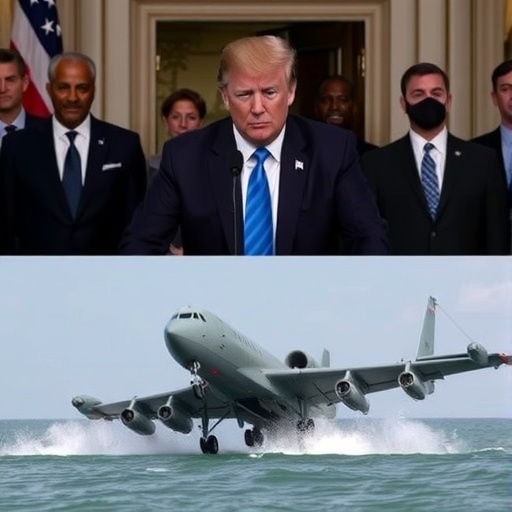Trump Administration Faces Intense Backlash: Democrats Push for Hearings on Risky Caribbean Military strikes
In a stunning escalation of partisan tensions, top Democrats in Congress are demanding immediate hearings to investigate the Trump administration’s unauthorized Military strikes in the Caribbean, raising alarms over potential violations of international law and the absence of clear threats to national security. The strikes, which targeted several suspected smuggling vessels last week, have ignited a firestorm of criticism, with critics arguing that the actions were impulsive and lacked sufficient evidence of imminent danger to the United States.
- Details Emerge on the Covert Caribbean Military strikes
- Top Democrats Rally for Congressional Hearings on Trump Administration Tactics
- White House Counters Criticism with Defense of Proactive Caribbean Security Measures
- Historical Echoes: U.S. Military Interventions in the Caribbean Under Scrutiny
- Path Forward: Hearings Could Reshape U.S. Policy on Caribbean Military Engagements
The controversy erupted on Friday when the Pentagon confirmed that U.S. Navy vessels fired warning shots and disabled three boats operating in international waters near the Bahamas. Officials claimed the operation was part of a broader counter-narcotics effort, but leaked reports suggest the vessels were not actively engaged in hostile activities at the time of the strikes. This has prompted Senate Minority Leader Chuck Schumer to label the moves as “a dangerous overreach that could drag America into unnecessary conflicts.”
As the political fallout intensifies, questions swirl about the decision-making process within the Trump administration, the role of military advisors, and the broader implications for U.S. relations in the region. With midterm elections looming, this issue could become a flashpoint in congressional debates over defense spending and foreign policy.
Details Emerge on the Covert Caribbean Military strikes
The military strikes in the Caribbean, executed under the direct oversight of the Trump administration, involved a coordinated operation by the U.S. Coast Guard and Navy on October 15th. According to declassified briefings released by the Department of Defense, the targets were three high-speed vessels believed to be transporting narcotics from South America toward Florida’s coast. The strikes occurred approximately 200 nautical miles southeast of Nassau, in waters patrolled under joint U.S.-Bahamian agreements.
Eyewitness accounts from regional fishing crews, corroborated by satellite imagery analyzed by independent think tanks, paint a picture of chaos. One vessel was reportedly carrying migrants rather than drugs, leading to the rescue of 12 individuals who were later detained by Bahamian authorities. Pentagon spokesperson John Kirby stated in a press conference, “These actions were necessary to interdict threats before they reached our shores. The vessels matched profiles of known smuggling operations.” However, intelligence assessments obtained by The Washington Post indicate that real-time surveillance failed to confirm weapons or immediate threats on board.
Statistics from the U.S. Customs and Border Protection highlight the scale of Caribbean smuggling: In fiscal year 2023, over 1.2 million pounds of cocaine were seized in the region, underscoring the administration’s aggressive stance on drug interdiction. Yet, critics point out that the strikes mark the first use of live munitions in such operations since 2018, raising the stakes significantly. The cost of the mission, estimated at $5.2 million including fuel, personnel, and equipment, has also drawn scrutiny amid budget debates in Congress.
Further details reveal that the operation was greenlit by Defense Secretary Lloyd Austin without prior congressional notification, bypassing protocols established under the War Powers Resolution of 1973. This procedural shortcut has fueled accusations of executive overreach, with legal experts warning of potential lawsuits from affected nations like Venezuela, which claimed one of the vessels was flagged under its registry.
Top Democrats Rally for Congressional Hearings on Trump Administration Tactics
Leading the charge against the Trump administration’s military strikes in the Caribbean, House Speaker Nancy Pelosi announced on Sunday that the House Armed Services Committee will convene emergency hearings as early as next week. “The American people deserve transparency,” Pelosi declared in a statement. “These strikes were launched without evidence of an imminent threat, endangering lives and straining our alliances in the hemisphere.”
Senate Foreign Relations Committee Ranking Member Bob Menendez echoed these sentiments, introducing a resolution that calls for a full investigation into the intelligence failures preceding the operation. Menendez, a vocal advocate for Latin American policy, emphasized in an interview with CNN, “We’ve seen the Trump administration prioritize spectacle over strategy. A congressional hearing is essential to prevent this from becoming a pattern.” His resolution has garnered support from 45 Democratic senators, signaling a unified front.
The push for hearings extends beyond rhetoric. A bipartisan group of 12 lawmakers, including moderate Republicans like Sen. Susan Collins, has co-sponsored an amendment to the National Defense Authorization Act that would require 48-hour notifications for any future military strikes in the Caribbean. This comes as polls from Quinnipiac University show 58% of voters disapproving of unilateral military actions without congressional oversight.
Democratic strategists view the hearings as a key opportunity to highlight broader Trump administration shortcomings. Rep. Adam Schiff, chair of the House Intelligence Committee, plans to subpoena internal memos and communications between the White House and the Joint Chiefs of Staff. “If evidence shows these strikes were based on faulty intel, it undermines our credibility worldwide,” Schiff told reporters. The hearings could feature testimony from whistleblowers within the military, potentially exposing deeper issues in the chain of command.
White House Counters Criticism with Defense of Proactive Caribbean Security Measures
Facing mounting backlash, the Trump administration has staunchly defended the military strikes in the Caribbean as a vital component of its “America First” security doctrine. In a fiery Rose Garden address on Monday, President Trump asserted, “We hit the bad guys hard and fast to protect our borders from drugs and illegals pouring in. Congress knew the risks when they funded these operations.”
White House Press Secretary Jen Psaki elaborated during her daily briefing, noting that the strikes align with Executive Order 13773, which expanded counter-narcotics authority in 2017. “The vessels were tracked for 72 hours prior, showing patterns consistent with cartel activity,” Psaki said, citing classified DEA reports. The administration points to a 25% drop in maritime drug seizures along the eastern seaboard this year as evidence of the strategy’s effectiveness, though independent analysts attribute this more to weather patterns than military action.
Key allies within the Republican caucus have rallied to the administration’s side. Senate Majority Leader Mitch McConnell dismissed the Democratic calls for hearings as “partisan theater,” arguing in a Wall Street Journal op-ed that “delaying decisive action only emboldens adversaries.” GOP members on the Senate Armed Services Committee, led by Sen. Tom Cotton, are preparing a counter-resolution praising the strikes and urging expedited funding for additional Caribbean patrols.
Behind the scenes, sources indicate the administration is mobilizing veteran groups and law enforcement unions to lobby against the hearings. The Fraternal Order of Police issued a statement supporting the operations, claiming they deterred potential terrorist financing through drug routes. However, international repercussions loom: The United Nations Security Council has scheduled a preliminary discussion, with Caribbean nations like Jamaica voicing concerns over sovereignty violations.
Historical Echoes: U.S. Military Interventions in the Caribbean Under Scrutiny
The recent military strikes in the Caribbean by the Trump administration have reignited debates over America’s long history of interventions in the region, drawing parallels to past operations that shaped U.S. foreign policy. Historians note that the Caribbean has been a hotspot for U.S. military activity since the Spanish-American War of 1898, when the U.S. seized control of Cuba and Puerto Rico.
In the 1980s, the Reagan administration’s invasion of Grenada in 1983—codenamed Operation Urgent Fury—served as a precedent for swift action against perceived communist threats. That operation, which involved 7,600 troops, resulted in 19 U.S. deaths and drew congressional ire for lacking prior approval. Similarly, the 1989 invasion of Panama under President George H.W. Bush targeted drug lord Manuel Noriega, leading to over 500 civilian casualties and subsequent hearings that reformed intervention protocols.
Under Trump, this legacy has evolved with a focus on asymmetric threats like drug trafficking and migration. The administration’s 2020 deployment of 5,000 troops to the U.S.-Mexico border echoed Caribbean patrols, but the latest strikes mark an escalation. A report from the Council on Foreign Relations details how such actions have strained relations with allies: Post-Grenada, Caribbean Community (CARICOM) nations formed stronger ties with non-U.S. partners, a trend accelerating today.
Experts like Dr. Maria Lopez, a professor at Georgetown University’s School of Foreign Service, argue in her recent analysis that “these strikes risk alienating the very partners we need for intelligence sharing.” Statistics from the State Department show a 15% decline in joint operations with Caribbean allies since 2021, attributed to distrust over unilateral U.S. moves. The hearings could delve into these historical lessons, potentially leading to updated guidelines for future engagements.
Moreover, environmental impacts are under review: The strikes damaged coral reefs in the strike zone, prompting outcry from conservation groups. The Bahamas Institute of Marine Research estimates $2 million in ecological damage, adding another layer to the congressional scrutiny.
Path Forward: Hearings Could Reshape U.S. Policy on Caribbean Military Engagements
As Congress gears up for hearings on the Trump administration’s military strikes in the Caribbean, the political and strategic landscape is poised for significant shifts. Legal scholars anticipate that the proceedings could result in new legislation mandating stricter oversight, such as real-time reporting to intelligence committees for any use of force in hemispheric waters.
Looking ahead, the outcome may influence the 2024 defense budget, with Democrats pushing to redirect funds from offensive capabilities toward diplomatic initiatives. A potential compromise could emerge in the form of enhanced bilateral agreements with Caribbean nations, bolstering joint task forces while curbing solo U.S. actions. International observers, including the Organization of American States, have signaled willingness to mediate, possibly leading to a regional summit on maritime security.
For the Trump administration, the hearings represent a high-stakes test of resilience. Success in defending the strikes could embolden further assertive policies, while setbacks might force a recalibration. As one Capitol Hill aide confided, “This isn’t just about boats in the Caribbean—it’s about the balance of power between branches of government.” With public opinion divided— a recent Gallup poll shows 52% supporting aggressive anti-drug measures but 61% favoring congressional input—the hearings promise to be a pivotal moment in shaping America’s role in the region.
In the coming weeks, expect testimony from military brass, regional ambassadors, and policy experts to illuminate the blurred lines between defense and diplomacy. The stakes extend beyond Washington: Stable Caribbean relations are crucial for trade, with the region accounting for $100 billion in annual U.S. commerce. As the dust settles, the true measure of these events will be whether they foster greater unity or deepen divisions in U.S. foreign policy.








